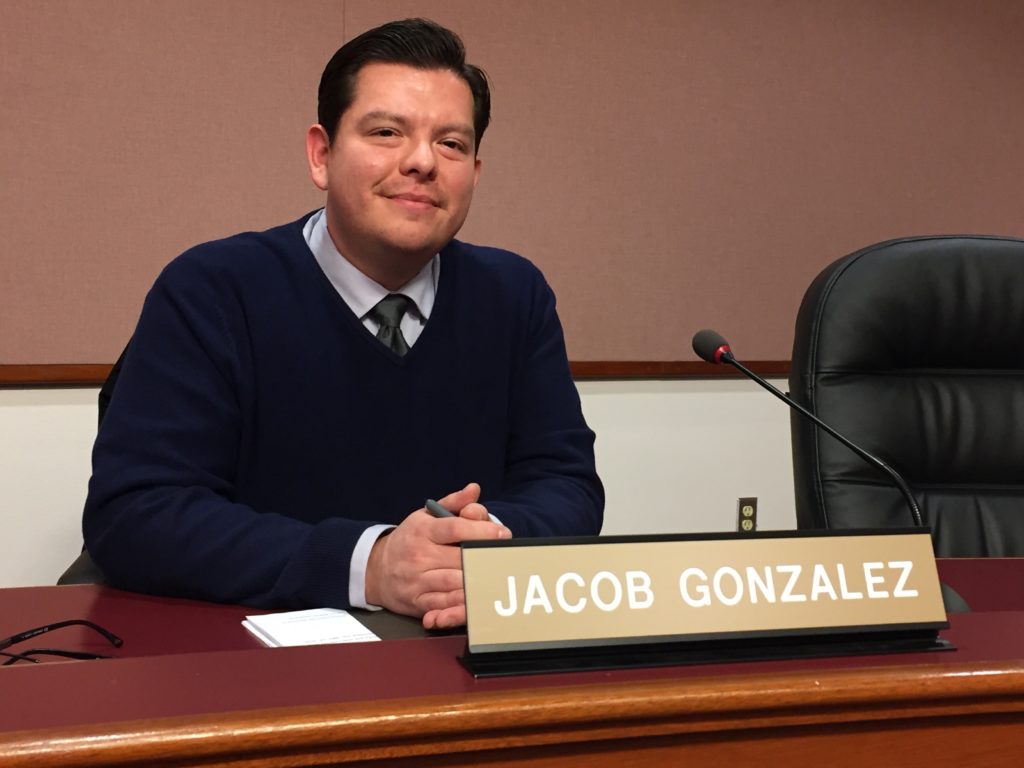Pasco, WA was one of five small and mid-sized cities/ counties (along with Bethlehem, PA; Gallatin County, MT; Huntsville, AL; and Kalamazoo County, MI) that joined the Housing Solutions Lab’s inaugural Housing Solutions Workshop (HSW). The workshop was designed to guide city and county delegations in developing comprehensive, balanced, and equitable local housing strategies. In January 2022, we interviewed Pasco’s Planning Manager, Jacob Gonzalez to hear more about how participating in the HSW impacted his team’s capacity to approach urgent housing policy issues and guided their development of a comprehensive housing plan. The conversation is printed in full below (edited for clarity and length).
Nestled at the confluence of the Yakima, Snake, and Columbia Rivers in southeastern Washington State, Pasco is rapidly evolving from a small town into a small to midsize city. A range of factors, including mild climate, affordability relative to other Washington cities, economic opportunities, and diversity (nearly a quarter of the city’s residents are foreign-born) have helped make it one of the fastest growing cities in Washington State for decades. Pasco’s population nearly doubled between 2000 – 2010 before leaping another 30% to 77,108 residents from 2010 – 2020.
Rapid population growth has tangibly benefited Pasco and the region. The Tri-Cities (comprising Pasco and two neighboring cities, Kennewick and Richland), have long been an agricultural economic hub. Employment opportunities driven by initiatives like the Columbia Basin Project, which transformed 700,000 acres into irrigated farm land and by popular recreational areas, generated economic opportunity and attracted new residents. More recently, major industrial employers have invested in the region,diversifying Pasco’s economic profile. Notably, in September 2021, Amazon announced that it will be opening two distribution centers in Pasco which will employ 1,500 people. An expanding consumer base has also spurred sales tax revenue, which has increased by more than 7 percent annually since 2014, and commercial construction spending which increased from $13 million in 2019 to $22 million in 2020.
Escalating housing costs suggest that Pasco’s housing laws and supply are inadequate to match the scale of current needs and future demand. The City’s 2018 – 2038 Comprehensive Plan found that Pasco will need over 15,000 new homes to accommodate population growth. Under current zoning laws, anticipated new construction will fall 34% short of that mark. This is largely due to the fact that 84% of residentially zoned land in the city prohibits multi-family homes, including duplexes and attached single-family homes. Accordingly, detached, single-family dwelling units comprise over 71% of Pasco’s housing stock. These and other policy decisions, including banning detached accessory dwelling units (although this will change shortly), were made decades ago to encourage homeownership when Pasco was a small town with a largely agricultural economy. Now that it is rapidly becoming a small to midsize commercial hub, new housing strategies and policy changes are required to ensure equitable development that helps Pasco thrive.
Jess Wunsch (Housing Solutions Lab Peer Cities Manager): Through the HSW we heard a lot about some of the challenges that Pasco has been facing in terms of housing, including rapid population growth and changes in workforce and employment opportunities. Can you briefly expand on what you view as the main housing challenges facing Pasco?
Jacob Gonzalez (Pasco Planning Manager): Rapid growth is certainly something we have been seeing for some time now. It has led to a lot of great opportunities – certainly new employers, including large industrial employers – that are diversifying our economic portfolio. However, one of the challenges we face is that our housing policies have not kept up with that growth. They are stuck in the 1980s. We rely on detached housing and our land-use policies restrict higher-density housing. At the time, the intent was to encourage homeownership but in practice residents are left with limited housing options. We need to evaluate our housing framework in the same way we would review our annual budget – go line by line and identify inconsistencies, gaps, and deficiencies. This will reveal a lot of unintended barriers to our municipal housing framework.
Jess: Building off of that, are there any policies that, until this point, you have implemented to try to remedy some of these issues?
Jacob: For the past four years, the whole city government has been focused on increasing access to housing. Up until now, though, there has not been a strategic or comprehensive approach to this goal. We have undertaken ambitious individual planning efforts, though. For example, in 2018, the city rolled out single-room occupancy buildings which have been really popular. Right now we are working on converting 600 units from outdated, unsafe hotel rooms into potential living units. Then, in 2019, the Washington state legislature passed House Bill 1923 which increases residential buildings’ capacity under the state’s Growth Management Act. Pasco was one of about 50 communities that took advantage of that incentive by working on three changes to our zoning code: increasing lot size flexibility, hitting the missing middle component (allowing for duplexes, triplexes, etc.) which we are finalizing with our City Council now, and legalizing accessory dwelling units across the city.

These are modest changes, but ones that could have a lot of impact in the future, because we have plenty of room to grow spatially. From the funding side, the city has an active Community Development Block Grant program. We also took advantage of WA House Bill 1406 which allows us to take a portion of a sales tax credit that usually is directed to the state to finance the construction and rehabilitation of affordable housing units. Using data provided by the NYU Furman Center, we learned that we will be losing about 600 affordable housing units over the next six to eight years so we know that preserving those units has to be a top priority.
Jess: So what drew you to HSW and prompted you to apply?
Jacob: City leadership understands that housing is a priority but most housing policy research is on large cities. We cannot always apply those lessons to a city of 80,000 people. So, when I saw a brief from the Furman Center about the housing characteristics of small and midsize cities, I thought, “this is amazing!” We can benefit tremendously by studying the challenges or avoiding the mistakes that similarly sized cities have faced. So I reached out to the Furman Center team to express my appreciation for their research. They set up a meeting with me and that is where I learned about the HSW.
Jess: Can you talk about the current comprehensive housing planning process that Pasco is in the middle of working on – the Housing Action Plan?
“The Housing Needs Assessment Tool, in particular, revealed a lot about Pasco’s racial equity issues.”
Jacob: Historically, Pasco has only done the housing element of a comprehensive plan that is required by Washington State’s Growth Management Act. We have learned, like many other cities, how important it is to have a broader, strategic approach to housing than we traditionally have. So, we proposed that a housing action plan be conducted through a City Council budget initiative. The intent was to evaluate our basic policies, zoning, and development standards.
After the HSW, we realized we want to learn more about our local market to really understand the conditions and financial mechanisms that impact housing production because we need to work within those confines. We also need to evaluate how housing policies impact community members and develop a strategic, equitable approach that includes a breadth of stakeholders including home builders, affordable housing residents, people having trouble accessing housing, advocates, large employers, and transit providers. We are trying to be strategic in our Housing Action Plan, but we have also learned how important it is to be comprehensive and to give a voice to people who do not always have one in government.
Jess: Can you expand on how you have integrated the main takeaways from the HSW into that process?
Jacob: You usually have to pay consultants to dig into the census for data but, fortunately, the HSW helped us avoid some of that. The Housing Needs Assessment Tool, in particular, revealed a lot about Pasco’s racial equity issues. We can also build other data that the Furman Center team produced into our plans and policies. This information can be the starting point for the Housing Action Plan’s scope.
Jess: During the Workshop, your team assessed your own housing policies. Do you feel like that experience helped highlight additional areas to focus on or some specific policies that you might want to implement in the future?
Jacob: We are still very early on in evaluating our existing housing policies and incorporating new ones into our plans, but the HSW made it clear that we need to be more comprehensive. We need objective policy recommendations that have specific metrics attached to them that allow us to develop performance measures and to identify what it is that we are really trying to accomplish. We know we have a lack of multifamily housing, but by how much, for who, and where? We know we need a lot of everything right now, but the HSW taught us that we have to move away from broad policy statements and towards measurable solutions.
Jess: Building off of how you make that happen, do you feel like the HSW impacted the capacity of your team to approach or address your work?
Jacob: Our team was different than other cities in the HSW because our whole delegation was made up of city staff. Before city staff offer solutions and recommendations to the community, we need to truly understand the housing issues we are trying to solve. I think it was beneficial that we went through this together as a team because it was a team-building experience, especially working with the other cities and counties. Coupled with all of the resources provided by the Furman Center and Lincoln Institute of Land Policy, this experience gave us a higher-level understanding of where we need to go.
Jess: My final question is how would you sum up your experience in the HSW?
Jacob: Our team really appreciated the sessions and facilitators. Specifically, the session about equity and how important it is to really acknowledge and address the role housing policies have played, and still play, in whether or not folks can access housing. It was a valuable team-building experience for our delegation and it was great to discuss our stories with Gallatin County, Huntsville, Kalamazoo County, and Bethlehem. Also, although the homework assignments were thorough, they helped us maximize our time in the sessions. Because of the HSW, we have a much better understanding of where we are and where we need to go so, if there was a part two, I would sign up for that as well!
Note: If you work on housing policy in a small or mid-sized city (50,000 – 500,000 residents) and are interested in future training and networking opportunities, connecting with housing policy leaders in cities facing similar housing policy issues, or receiving technical assistance on a variety of housing policy questions, please join our mailing list, visit our ‘Ask the Lab’ page, or reach out to Jess Wunsch, Peer Cities Manager, at jw7556@nyu.edu.
